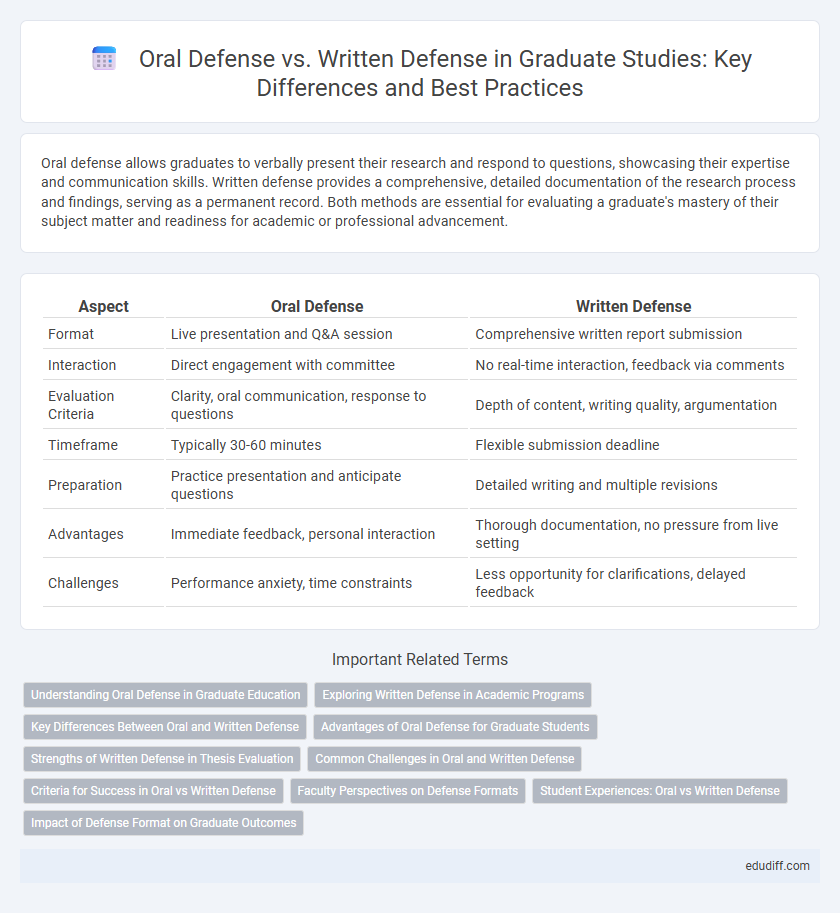Oral defense allows graduates to verbally present their research and respond to questions, showcasing their expertise and communication skills. Written defense provides a comprehensive, detailed documentation of the research process and findings, serving as a permanent record. Both methods are essential for evaluating a graduate's mastery of their subject matter and readiness for academic or professional advancement.
Table of Comparison
| Aspect | Oral Defense | Written Defense |
|---|---|---|
| Format | Live presentation and Q&A session | Comprehensive written report submission |
| Interaction | Direct engagement with committee | No real-time interaction, feedback via comments |
| Evaluation Criteria | Clarity, oral communication, response to questions | Depth of content, writing quality, argumentation |
| Timeframe | Typically 30-60 minutes | Flexible submission deadline |
| Preparation | Practice presentation and anticipate questions | Detailed writing and multiple revisions |
| Advantages | Immediate feedback, personal interaction | Thorough documentation, no pressure from live setting |
| Challenges | Performance anxiety, time constraints | Less opportunity for clarifications, delayed feedback |
Understanding Oral Defense in Graduate Education
Oral defense in graduate education requires clear articulation of research objectives, methodology, and findings, allowing direct interaction and immediate feedback from faculty members. This format evaluates a student's critical thinking, problem-solving skills, and ability to verbally communicate complex concepts, setting it apart from the written defense's focus on comprehensive documentation. Mastery of oral defense techniques enhances confidence and prepares graduates for professional presentations and academic discourse.
Exploring Written Defense in Academic Programs
Written defense in academic programs offers graduate students a structured method to demonstrate comprehensive knowledge and critical thinking without the pressure of immediate oral questioning. It allows detailed articulation of research findings and theoretical insights through carefully crafted documents, which faculty members evaluate for depth, coherence, and originality. This format provides flexibility for institutions to assess complex ideas systematically, supporting diverse academic disciplines where written communication is paramount.
Key Differences Between Oral and Written Defense
Oral defense involves a live presentation and interactive questioning by the thesis committee, allowing for immediate clarification and discussion, whereas written defense is a detailed documented submission evaluated without direct verbal interaction. Oral defenses test a graduate's ability to verbally communicate and defend research findings in real-time, highlighting presentation skills and argumentation under pressure. Conversely, written defenses emphasize the clarity, depth, and coherence of the content, focusing on the quality of written communication and comprehensive analysis in the thesis document.
Advantages of Oral Defense for Graduate Students
Oral defense allows graduate students to actively engage with committee members, demonstrating their expertise and critical thinking in real-time, which can lead to immediate clarification and feedback. This format fosters dynamic discussion, enhancing the student's ability to articulate complex ideas clearly and respond to challenging questions with confidence. Furthermore, oral defense encourages the development of communication skills essential for professional success beyond academia.
Strengths of Written Defense in Thesis Evaluation
Written defense in thesis evaluation offers thorough documentation, allowing evaluators to review complex arguments and evidence systematically. It provides a permanent record that can be revisited for clarity and citation purposes, enhancing transparency in the assessment process. The format supports detailed feedback and minimizes the pressure of immediate responses, catering to diverse evaluators' schedules and preferences.
Common Challenges in Oral and Written Defense
Graduate students often face challenges in both oral and written defense, including effectively communicating complex research findings and addressing critical questions from faculty committees. Oral defenses require clear articulation and quick thinking to respond to real-time probing, while written defenses demand precision in presenting arguments and thorough documentation of methodological rigor. Common difficulties include managing time constraints, overcoming anxiety, and ensuring clarity and coherence in both verbal and written formats.
Criteria for Success in Oral vs Written Defense
Success in an oral defense is primarily measured by the candidate's ability to clearly articulate research findings, respond confidently to questions, and demonstrate in-depth understanding of the subject matter. In contrast, a written defense is evaluated based on the clarity, coherence, and rigor of the documented research, including the quality of the argumentation and adherence to academic standards. Both formats require thorough knowledge but emphasize different communication skills: verbal articulation and quick thinking for oral defense, and structured, precise writing for written defense.
Faculty Perspectives on Defense Formats
Faculty members often view oral defenses as a dynamic platform for assessing a graduate student's depth of knowledge, critical thinking, and ability to articulate complex ideas under pressure, while written defenses are seen as opportunities for detailed, structured evaluation of research rigor. Oral defense formats allow faculty to engage directly, pose spontaneous questions, and gauge the candidate's mastery and confidence, which can be crucial for professional development and future academic interactions. In contrast, written defenses provide faculty a comprehensive document that can be reviewed meticulously, supporting a thorough critique of methodology, analysis, and scholarly contribution without the immediacy of real-time interaction.
Student Experiences: Oral vs Written Defense
Graduate students often describe oral defenses as intensive, interactive experiences that allow real-time feedback and clarification, fostering a dynamic dialogue with the committee. In contrast, written defenses provide a more reflective and controllable environment where students can carefully craft and revise their responses before submission, reducing immediate pressure. Many students find oral defenses more challenging due to the spontaneity and public aspect, while written defenses offer a structured pace but may feel less engaging and personal.
Impact of Defense Format on Graduate Outcomes
Oral defense allows graduates to demonstrate critical thinking and communication skills, often leading to stronger academic networking and job placement opportunities. Written defense emphasizes clarity and depth of research, contributing to higher publication rates and scholarly recognition. The choice between oral and written defense significantly influences graduates' professional development and academic success.
Oral Defense vs Written Defense Infographic

 edudiff.com
edudiff.com